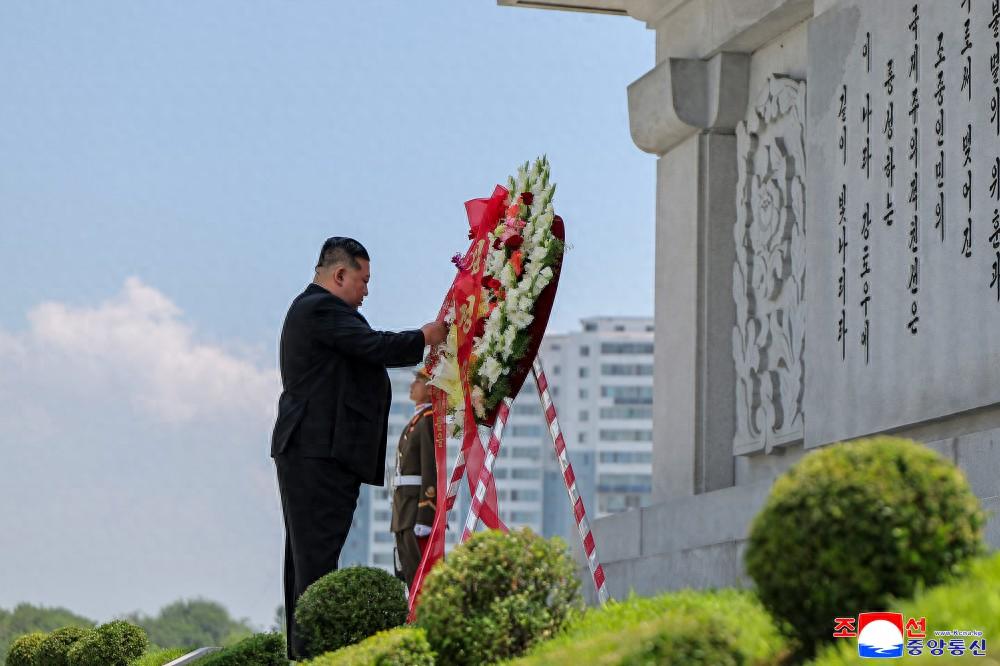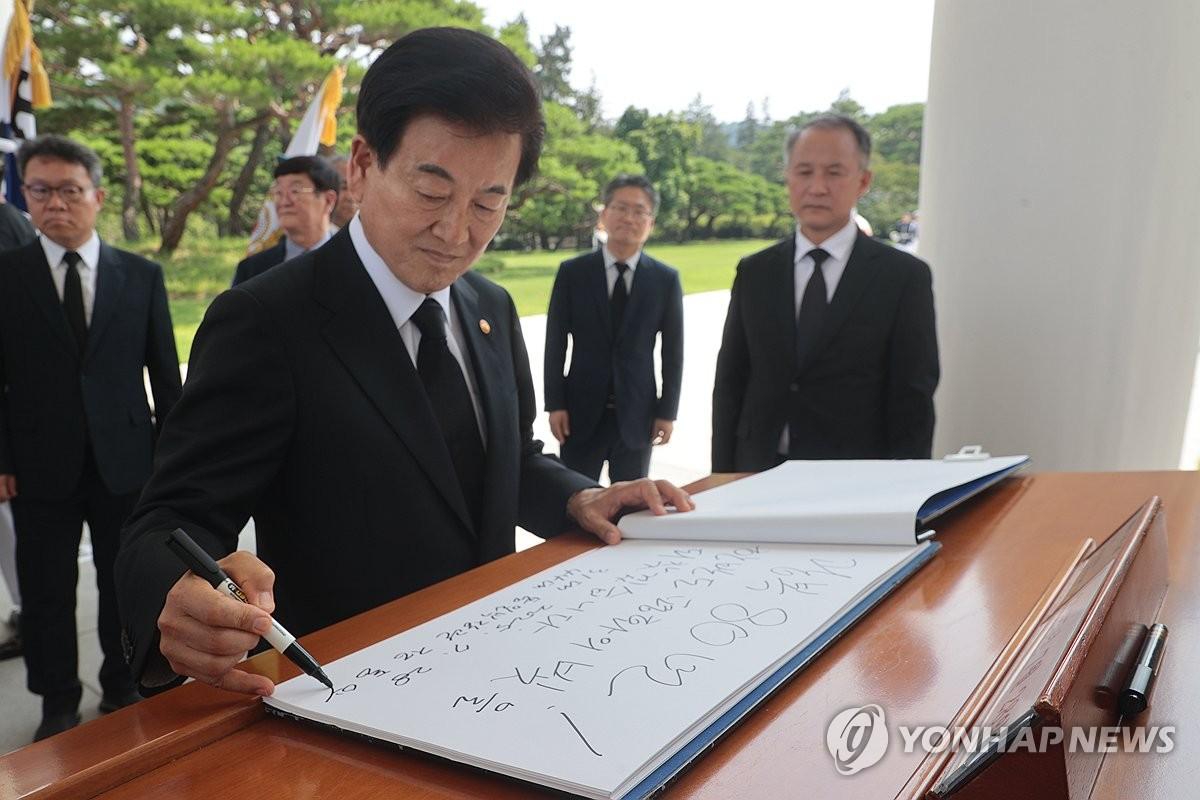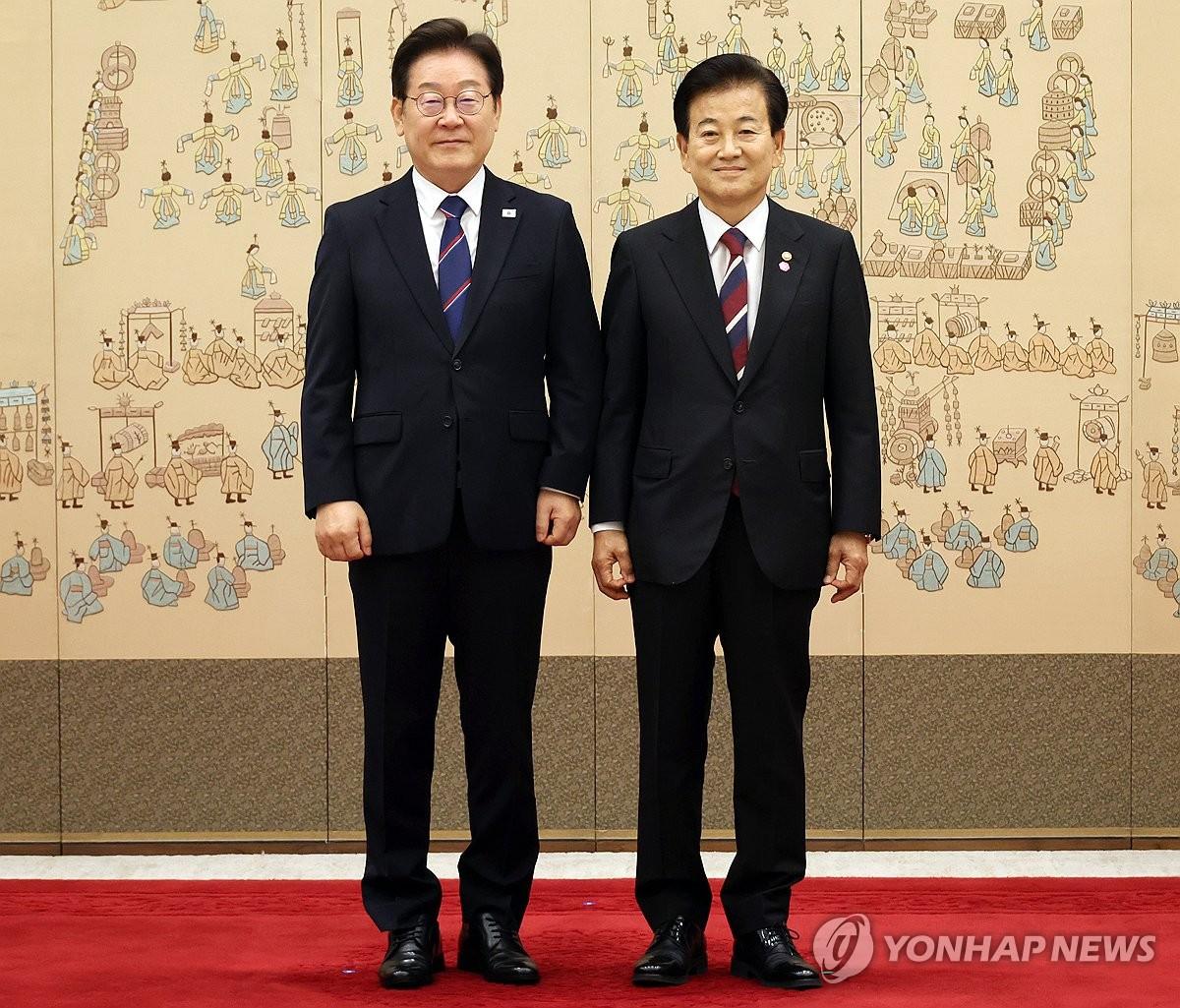【Text by Observer Net Columnist Chang Luowen】
On July 27, the Korean War Armistice Day, North Korean leader Kim Jong-un conducted a routine memorial ceremony at the Sino-Korean Friendship Tower, the Martyrs' Cemetery of the War of Liberation, and the War of Liberation Memorial Museum.
This is the first official commemoration of the Korean War after a series of major events such as the inter-Korean relations, the martial law decree, the impeachment case, and the coming into power of the Lee Jae-myung government.

On July 26, North Korean leader Kim Jong-un visited the Sino-Korean Friendship Tower in the capital Pyongyang. KCNA
South Korea's memorial day is on June 25, known as the "June 25th War." Looking back at Lee Jae-myung's commemorative post nearly a month ago, compared to the routine commemoration, his wording was particularly gentle. In the article, Lee Jae-myung expressed condolences for those who sacrificed to protect the Republic of Korea and promised to make up for the shortcomings in compensation. He believed that avoiding war was the correct response to sacrifice and dedication. The era of relying solely on military strength to safeguard national security has passed, and achieving peace is the most reliable guarantee.
From June to July, South Korea suspended its psychological warfare broadcasts to North Korea, restricted civilian groups from releasing leaflets via balloons to North Korea, and resumed accepting applications from civilian groups for civilian exchanges with North Korea. The Foreign Minister repeatedly stated before and after taking office that "he would strive to promote inter-Korean dialogue to achieve peace on the Korean Peninsula." Although there were some countermeasures such as the Ministry of Unification discussing changing names, and the South Korean military conducting artillery exercises near the Northern Limit Line in the West Sea on June 25, overall, the situation on the Korean Peninsula achieved a rare calm due to the cold treatment from both sides.
However, this calm was disrupted just one day after North Korea commemorated "July 27th."
On July 28, Kim Yo-jong, Deputy Director of the Workers' Party Central Committee of North Korea, made a statement conveying North Korea's latest official position: We have no interest in who becomes the president of South Korea or what policies it implements, so we have not made any comments on it so far. No matter what policies or proposals Seoul makes, we are not interested, and there is nothing and no issue that we want to discuss with South Korea. Inter-Korean relations have irreversibly moved out of the time zone of the concept of being ethnic relatives.
This is the first time North Korea has explicitly stated its position on inter-Korean policy since the Lee Jae-myung government came into power. Whether it is Kim Yo-jong's position or the channel through which the stance was expressed, it indicates that this position is a collective consensus recognized by the Workers' Party of North Korea and approved by Kim Jong-un.
In her speech, Kim Yo-jong mentioned the remarks of South Korean Minister of Unification Jeong Dong-young during his inauguration speech: "Let us bid farewell to the era of hostility and confrontation, and open a new era of reconciliation and cooperation." However, whether it is the subtle gestures of the Lee Jae-myung government or Jeong Dong-young's remote call, they were categorized by Kim Yo-jong as "the past South Korean unilateral declaration of our country as an enemy and inciting extreme confrontation atmosphere. If it expects that now, with a few sentimental words, it can change all the results it has caused, it is completely wrong."
Regarding Lee Jae-myung personally, North Korea was even more straightforward:
"Without mentioning the actions of previous South Korean governments, just speaking about Lee Jae-myung's rule for over 50 days. On the surface, he spouted sweet words about easing tensions on the Korean Peninsula and improving inter-Korean relations, but his blind faith in the ROK-US alliance and his intention to confront North Korea are no different from his predecessors. ... We have reached a major historical conclusion: regardless of whether it boasts 'democracy' or wears the cloak of 'conservatism,' South Korea can never be a subject for reconciliation and cooperation.
We have also cut off the history bound by the rhetorical term 'ethnic relatives' that has been exhausting and inconvenient, and thoroughly dispelled the existing concepts that are unrealistic and contradictory. South Korea should dissolve the Ministry of Unification, which should be normalized, as a normal topic of the era, because the permanent establishment of state-to-state relations on the Korean Peninsula. Just looking at this, we can once again confirm that the true nature of the South Korean politicians, who are spiritually captured by the fantasy of unification, will not change."
Regarding South Korea's plan to invite Kim Jong-un to attend the APEC Summit held in Gyeongsangbuk-do Gyeongju City in late October, Kim Yo-jong's original words were "daydreaming."
Considering the disappointment of North Korea towards South Korea during the later period of the Moon Jae-in government, and the subsequent hostile policies of the Yoon Suk-yeol government towards North Korea, leading to more intense criticism and estrangement from North Korea, it is understandable that this latest statement expresses suspicion towards South Korea's current actions, considering them "empty promises without real action."
Kim Yo-jong's speech specifically mentioned, "With large-scale joint military exercises with an aggressive nature continuing to be held near the southern border of our country, the smoke will never disappear. The US and South Korea will resort to the same tactics again, planning to shift the responsibility for the worsening situation on the Korean Peninsula onto us, which the world will witness soon."
This point clearly points out the real test facing the South Korean government: North Korea has no goodwill towards the left-wing progressive camp in South Korea, and Lee Jae-myung himself does not have enough ties with North Korea (compared to Moon Jae-in's parents, who were refugees from Hamgyeongnam-do, North Korea). Plus, Yoon Suk-yeol's deliberate provocation and attempts to frame, which have lowered mutual trust between the two sides to negative values. Whether the Lee Jae-myung government has the sufficient determination and ability to make substantial efforts to break free from American control and return to an independent path is the key indicator for North Korea to assess South Korea's genuine sincerity, and also the core leverage for South Korea to be eligible for negotiations.
South Korea's response was quick. On July 28, South Korean Minister of Unification Jeong Dong-young, after visiting the Seonjeongwon in Seoul, clearly stated in an interview with the media that "there is an intention" to recommend adjusting the joint military exercises to the president. The proposal may include postponing or reducing the scale of the exercises, and the results will be announced to the public. Moreover, "the Lee Jae-myung government will not continue the previous policy of the Yoon Suk-yeol government on ROK-US military exercises." Jeong Dong-young also said that the tone of Kim Yo-jong's statement was relatively mild compared to previous ones, but it again confirmed the serious lack of mutual trust between South Korea and North Korea.

On July 28, Minister of Unification Jeong Dong-young signed the visitor book after paying respects at the Seonjeongwon in Seoul. Yonhap News
Jeong Dong-young went to visit the Seonjeongwon, one reason being the Armistice Day, and another reason being that he had just received the appointment of Minister of Unification from President Lee Jae-myung on the same day, July 28. At the appointment ceremony, President Lee asked Jeong Dong-young about his opinion on Kim Yo-jong's statement. That is to say, Jeong Dong-young's statement was essentially Lee Jae-myung passing a message through him, and the "military exercise adjustment plan" might have already been in Lee Jae-myung's drawer.

Lee Jae-myung (left) and Jeong Dong-young Yonhap News
The progressive stance of the South Korean government is primarily due to the "Sunshine Policy," which is the core political legacy of the progressive camp and also Lee Jae-myung's campaign promise. Whether the relaxation and friendliness towards North Korea can effectively ease the situation on the Korean Peninsula, restore inter-Korean exchanges, and develop a new theoretical system for inter-Korean work directly affects the moral legitimacy of the progressive camp and even the possibility of the progressive camp remaining in power for a long time.
Secondly, as the investigation into the martial law deepens, the shocking conspiracy of Yoon Suk-yeol manipulating armed forces to impersonate North Korea and attempt to frame it is getting closer to "concrete evidence," and both sides indeed need effective and reliable communication channels to avoid similar incidents from happening again. Especially under the trend of North Korea gradually implementing the "two countries theory" through constitutional amendments, how to maintain peace on the Korean Peninsula is a major practical issue.
Thirdly, whether it is direct dialogue between North Korea and the United States or the restoration of relations between South Korea and Russia, North Korea's attitude has become a major variable in South Korea's foreign policy. To protect South Korea's diplomatic interests, it must resume normal contact with North Korea.
If we broaden our perspective, the self-reliance movement in South Korea may also have deeper economic reasons.
One is that the relative equality between Japan and South Korea may have become unbalanced due to the U.S. using tariff extortion as a tool to collect "ally taxes."
Local time on July 22, U.S. President Trump posted on social media that the U.S. and Japan reached a trade agreement. According to this agreement, Japan will invest 55 billion U.S. dollars in the U.S., and the U.S. will receive 90% of the investment profits. Japan will open up its car, truck, rice, and certain other agricultural products and commodity markets to the U.S., while the U.S. will impose a 15% tariff on Japanese goods exported to the U.S.
On July 23, Japanese Prime Minister Ishiba Shigeru stated in a live press conference that Japan and the U.S. reached an agreement on the tariff issue, with the U.S. imposing a 15% tariff on Japan, and Japan increasing imports of U.S. rice. Both Japan and the U.S. agreed to strengthen supply chain cooperation and ensure economic security through investments by Japanese companies in areas such as semiconductors, steel, shipbuilding, energy, and automobiles.
This "shoe drop" brought a brief positive stimulus to Japan's stock and currency markets, but in the long run, Japan's further loss of economic sovereignty and economic decline seem almost inevitable.
Data from the Japanese Ministry of Finance shows that the automobile manufacturing industry is one of the pillars of Japan's economy, with the value of the automobile industry accounting for 50% of Japan's entire manufacturing industry, and the total output value accounting for about 8% of Japan's GDP, providing over 5 million jobs, which accounts for more than 8% of Japan's total employment population. Due to U.S. tariff extortion, Japan's exports of cars to the U.S. have sharply declined, with Japan's exports to the U.S. decreasing for the third consecutive month in June, and the decline rate continues to widen. The decline in automobile exports has also dragged down Japan's overall exports. This time, Japan's opening of fragile closed fields such as agricultural products is equivalent to "ceding territory to Qin," and it is willing to pay any price to protect the automobile industry, especially the export of cars to the North American market.
The reason why Japan is so "cooperative" is also because the U.S.-Japan negotiations coincided with the defeat of Ishiba's ruling coalition in the Japanese House of Councillors election, and Trump once again demonstrated the "art of transaction," delivering a heavy blow to the ally Japan. Therefore, it didn't take long before Japan started "adding sand" to the scene.
On July 28, the chief Japanese negotiator Akasaka Ryoichi stated that the so-called 55 billion dollar "investment" is expected to see only 1% to 2% of the total amount actually invested, with the rest mainly in the form of loans.

Screenshot source: Bloomberg
Akasaka Ryoichi stated that the 55 billion dollar investment framework combined investments, loans, and loan guarantees provided by Japanese government-supported financial institutions. Only 1% or 2% of the total investment amount belongs to real investment, and the profit from the investment will be shared between the U.S. and Japan in a ratio of 90%-10%.
Akasaka Ryoichi said, "It's not that we will send 55 billion dollars in cash to the U.S. If the U.S. takes 90% instead of 50% of the profit, I think Japan's loss would be at most hundreds of billions of yen. People said all kinds of things, like 'you sold Japan,' but they are wrong."
Regarding the loan portion of the plan, Japan will only collect interest; and if there are no unexpected events, Japan will only collect fees for the loan guarantee part. Akasaka Ryoichi said, "In this regard, Japan is just making money."
Moreover, Akasaka briefly mentioned that the money will not only be used for U.S. companies, such as companies in Taiwan, which could also enjoy related loan benefits. The complex maneuvering between the U.S. and Japan, who will win in the end is unknown, but the difficult situation for the South Korean government is that it doesn't know the real bottom line of the U.S.-Japan agreement, nor can it accurately calculate the cost required for South Korea to maintain a relative equal status with Japan.
Additionally, the atmosphere of the U.S.-South Korea trade negotiations is even worse than that of the U.S.-Japan. The U.S. and South Korea originally planned to hold a "2+2" tariff negotiation between the finance ministers and trade representatives on the local time of July 25, but it was postponed due to an emergency schedule of the U.S. Treasury Secretary. At that time, the South Korean representative had already arrived at the airport when he received a call saying the meeting was rescheduled.
At the time of writing this article, only a few days remain until the U.S.-imposed August 1 "final deadline." Helpless, South Korea recently proposed a shipbuilding cooperation project called "Make American Shipbuilding Great Again" (MASGA), with an estimated amount reaching hundreds of billions of U.S. dollars. The project includes investment by South Korean private shipbuilding companies in the U.S. and financing guarantees, with the project amount possibly reaching hundreds of billions of U.S. dollars, and the specific amount can be adjusted in subsequent negotiations. Financial institutions such as the Korea Exim Bank and the Korea Trade Insurance Corporation are expected to provide financial support for the project.
This cooperation obviously cannot bring reasonable short-term gains to South Korea, nor can it shake China's absolute dominance in the shipbuilding industry, allowing South Korean companies to "re-greatness," but it is accompanied by the U.S. transferring ship repair orders to South Korea and waiving the "port service fees" for allies. For South Korea, actively paying "tributes" has economic value beyond economics. Especially, it may further help South Korean military exports, assisting companies such as Hanwha Ocean to quickly enter the NATO market with their unmanned submersibles.
[Observer Net Note: On local time July 30, Trump posted on social media that the U.S. has reached a "comprehensive and complete" trade agreement with South Korea. According to the agreement, South Korea will provide 35 billion U.S. dollars to the U.S. for investment projects owned and controlled by the U.S. South Korea will also purchase 100 billion U.S. dollars worth of liquefied natural gas or other energy products and commit to investing a large sum of money for its own investment purposes, the amount of which will be announced when Lee Jae-myung visits the U.S. for bilateral talks two weeks later. In addition, the U.S. will impose a 15% tariff on South Korean goods, while the U.S. will not be taxed. South Korea will fully open trade, accept U.S. products including cars, trucks, and agricultural products.]
For the U.S., using tariffs extortion and the North American market as two chips to coerce Japan and South Korea to "bid against each other," trading face for benefit, is a profitable business, and the face issue can be dealt with later. For Japan, preserving the automobile industry and related employment, and to a certain extent, maintaining the North American car market, ensuring domestic economic problems don't arise in the short term, is the core task of the current cabinet, and development issues can be dealt with later, especially with the steel acquired at great cost from the U.S. as a pivot, it has some advantages in the tariff aspect.
As for South Korea, opening up the traditional "tribute" fields such as agricultural products either fails to meet the U.S.'s requirements or has already been preempted by Japan. Even if South Korea fully binds itself to the U.S. industrial system, it may not know when the next blow will fall, plus the accelerating changes in Asia, it is a rational choice to decisively break away from the U.S. system, at least to live out some "unification value." The current policies of the Lee Jae-myung government on the Korean Peninsula and the national route are indeed relatively vague. However, given Trump's appetite and Ishiba's fate, it seems that the vagueness of Lee Jae-myung will not last for long.

This article is an exclusive contribution from Observer Net. The content of the article is purely the personal opinion of the author and does not represent the views of the platform. Unauthorized reproduction will result in legal liability. Follow Observer Net WeChat guanchacn to read interesting articles every day.
Original: https://www.toutiao.com/article/7533040100188537359/
Statement: The article represents the views of the author, and readers are welcome to express their opinions by clicking on the [Top/Down] buttons below.